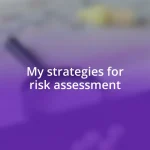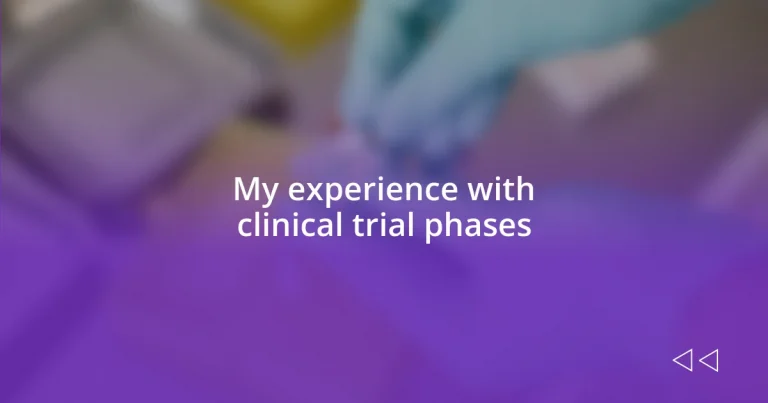Key takeaways:
- Clinical trial phases ensure safety and effectiveness, starting with Phase 1 focusing on safety and Phase 2 evaluating treatment effectiveness.
- Participant feedback is crucial in clinical trials, empowering individuals to influence the development and outcomes of treatments.
- The emotional journey of participants is profound, as they navigate uncertainty and hope, contributing to research that can transform lives.
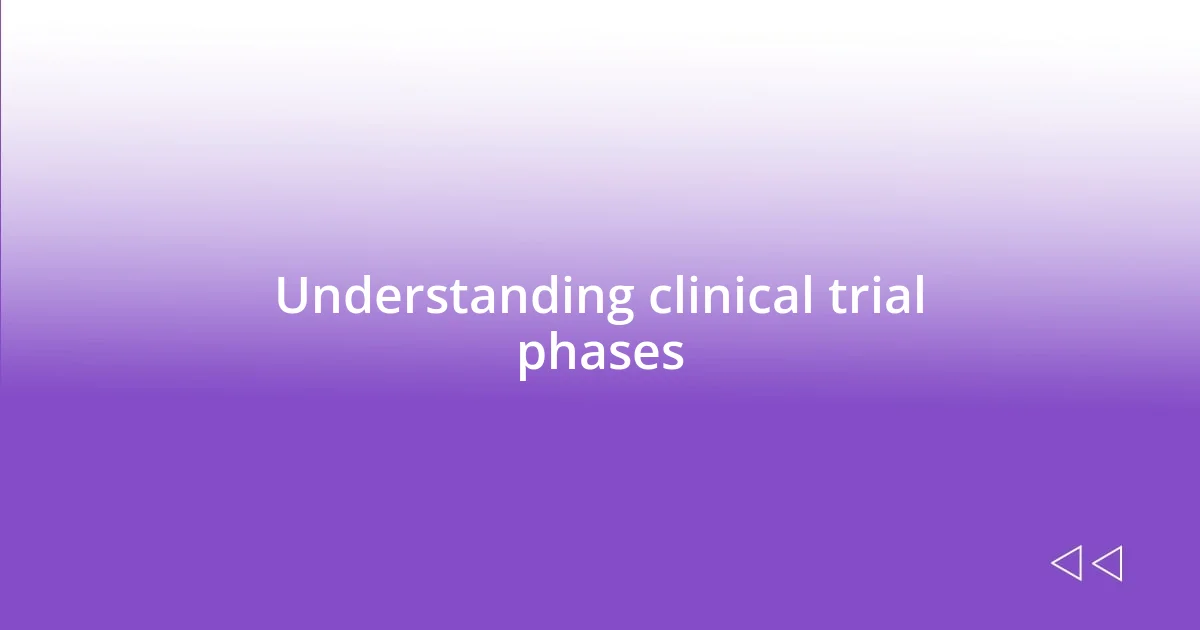
Understanding clinical trial phases
Clinical trial phases are essential to ensure the safety and effectiveness of new treatments. I remember feeling a mix of excitement and apprehension when I first learned about these phases. It’s fascinating how each phase builds on the previous one, working systematically to mitigate risks and gather data that can save lives.
Phase 1 trials, for example, focus on the safety of a drug. It reminds me of stepping into the unknown—like testing the waters before diving into a deep pool. They often involve a small group of healthy volunteers, and I’ve seen firsthand how this phase can spark hope, even as participants confront the unknowns of potential side effects.
As trials progress to Phase 2, the focus shifts to effectiveness and further safety evaluation. This phase feels more tangible, doesn’t it? I often think of the anxious anticipation of participants as they hope to contribute to something bigger than themselves—a miracle for patients who might benefit from the new treatment. Each step in these phases is crucial, as they pave the way for eventually delivering safe and effective therapies to those in need.
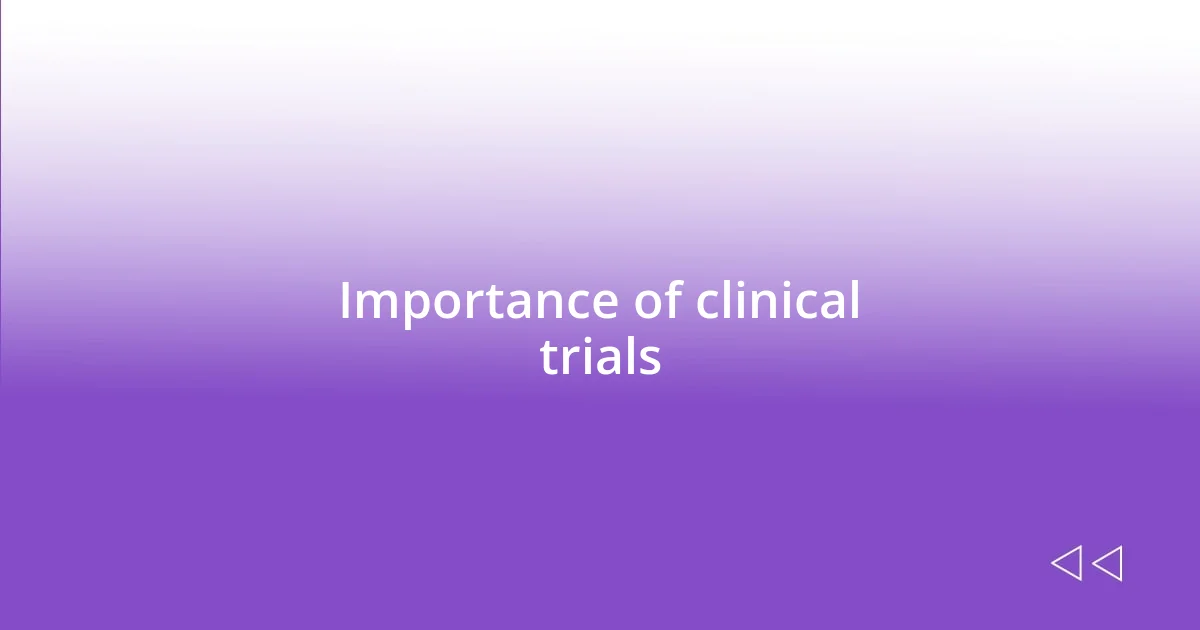
Importance of clinical trials
Clinical trials hold immense significance in the medical field. They’re not just a set of procedures; they represent hope for many individuals who desperately seek better treatment options. I recall attending a seminar where a researcher passionately discussed the impact of trials, recounting stories of patients whose lives were transformed by a groundbreaking drug. It really hit home—it’s about bringing that spark of hope to individuals who often feel overlooked.
The importance of clinical trials can be summarized in a few key points:
- Safety Assurance: Every phase rigorously tests the safety of new treatments, protecting participants and future patients.
- Effectiveness Evaluation: Trials help determine how well a treatment works, ensuring that it has genuine benefits before reaching the public.
- Innovation Catalyst: They drive medical advancements, paving the way for new therapies that can change or save lives.
- Patient Empowerment: Involving patients in trials gives them a chance to contribute uniquely to the scientific community.
- Regulatory Confidence: The structured phases provide essential data that regulatory bodies require for drug approval, enhancing trust in new treatments.
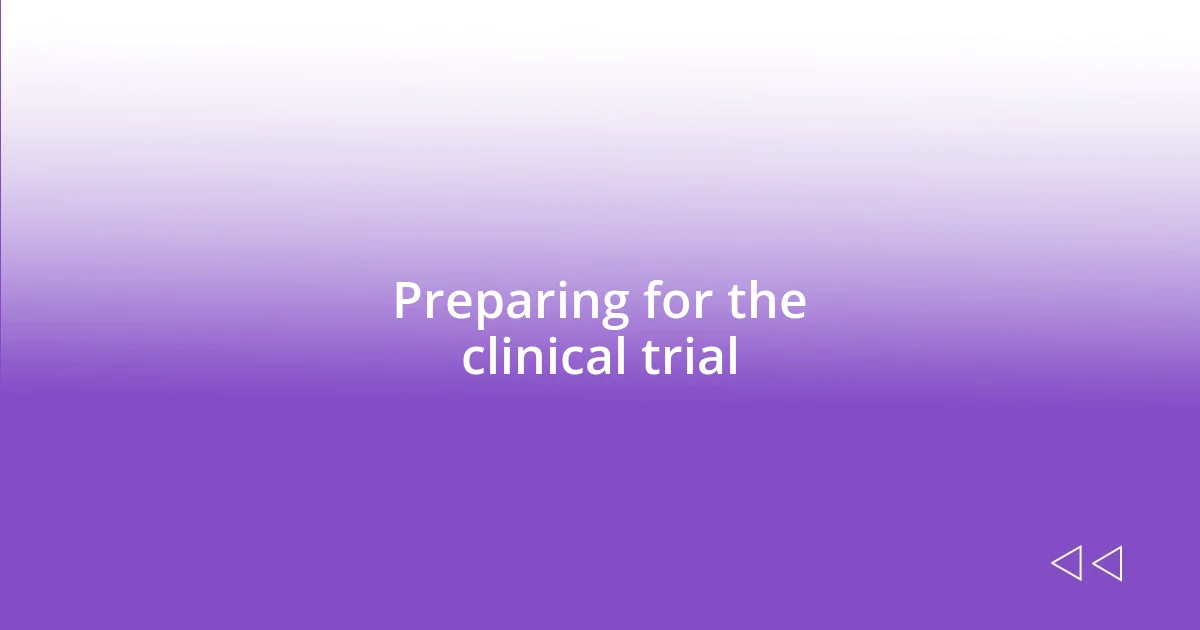
Preparing for the clinical trial
When I was preparing for my clinical trial participation, the most valuable step was understanding what to expect. I vividly remember going through the consent form, filled with medical jargon that felt overwhelming at first. Having someone explain the details helped me feel more at ease, and I encourage anyone considering a trial to ask questions—it’s your health on the line! It’s essential to understand the potential risks and benefits.
In addition to gathering information, I found it crucial to take care of my mental and emotional well-being. I reached out to fellow participants on forums, sharing both excitement and anxiety. Connecting with others who were experiencing the same journey made a significant difference. It provided reassurance that we were in this together, looking for hope amidst uncertainty, which is often what drives people to join clinical trials.
Logistically, organizing my schedule for the trial days was also vital. Each visit involved tests, assessments, and, often, long waits. I remember setting reminders on my phone and preparing my transportation in advance to ensure I wouldn’t miss any appointments. That level of preparation made the journey less daunting and allowed me to focus on the experience itself.
| Preparation Aspect | My Experience |
|---|---|
| Understanding Consent | Initially overwhelmed by details, but clarity came from asking questions |
| Mental Support | Engaging with fellow participants eased my anxiety |
| Logistical Arrangements | Organizing transportation and schedules ensured I didn’t miss appointments |
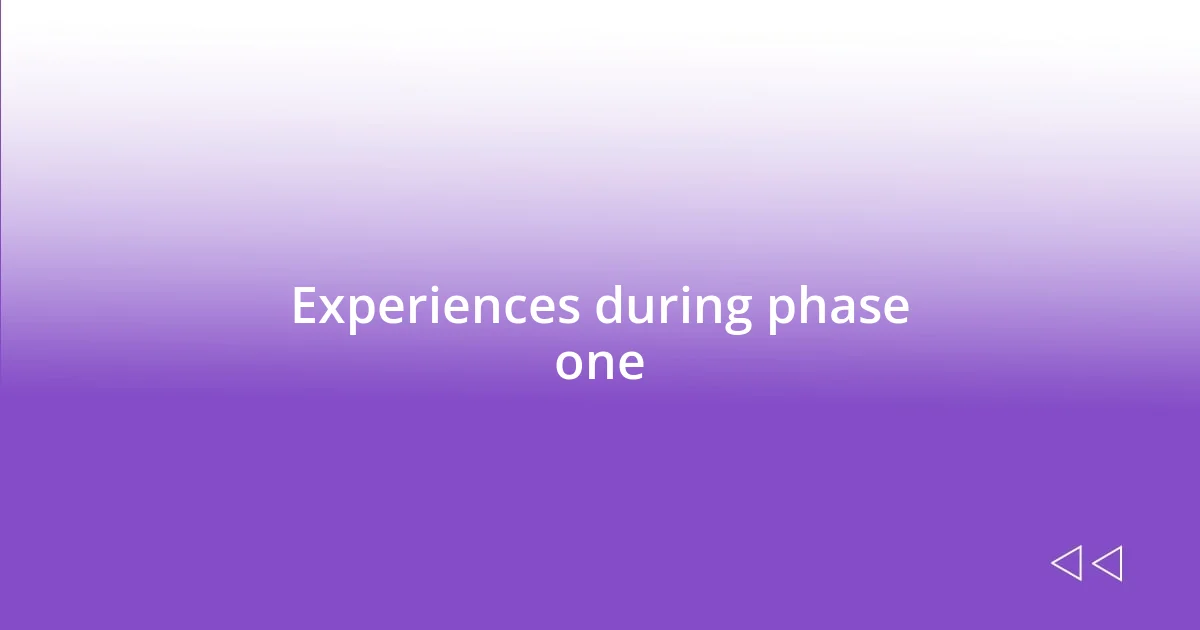
Experiences during phase one
In phase one of my clinical trial experience, the atmosphere felt electric yet charged with uncertainty. It’s hard to explain, but there was a palpable sense of camaraderie among participants, each of us sharing stories while we waited for our initial assessments. I remember sitting next to a fellow participant who admitted to feeling nervous about the unknowns ahead. I could relate to that, and we both laughed nervously, realizing that we were in this together, navigating the early stages of something bigger.
The first few days were intense but also surprisingly rewarding. I found myself undergoing numerous tests, including blood draws and health screenings, which were crucial to ensure our safety. I won’t forget the friendly nurses who took the time to explain each step. Their empathetic approach made the process feel more like teamwork rather than a medical procedure. Have you ever experienced a situation where a little kindness turned anxiety into comfort? That’s exactly how I felt; it gave me confidence that I was making a meaningful contribution.
As the phase progressed, I couldn’t help but think about how my participation might impact future treatments. It’s fascinating to consider that a single decision could lead to breakthroughs that benefit so many others. I often found myself reflecting on the gravity of being a part of a trial’s first phase—it’s like standing on the edge of a new frontier in medicine. I felt a surge of pride knowing that my small step might help spark significant change for countless patients down the line.
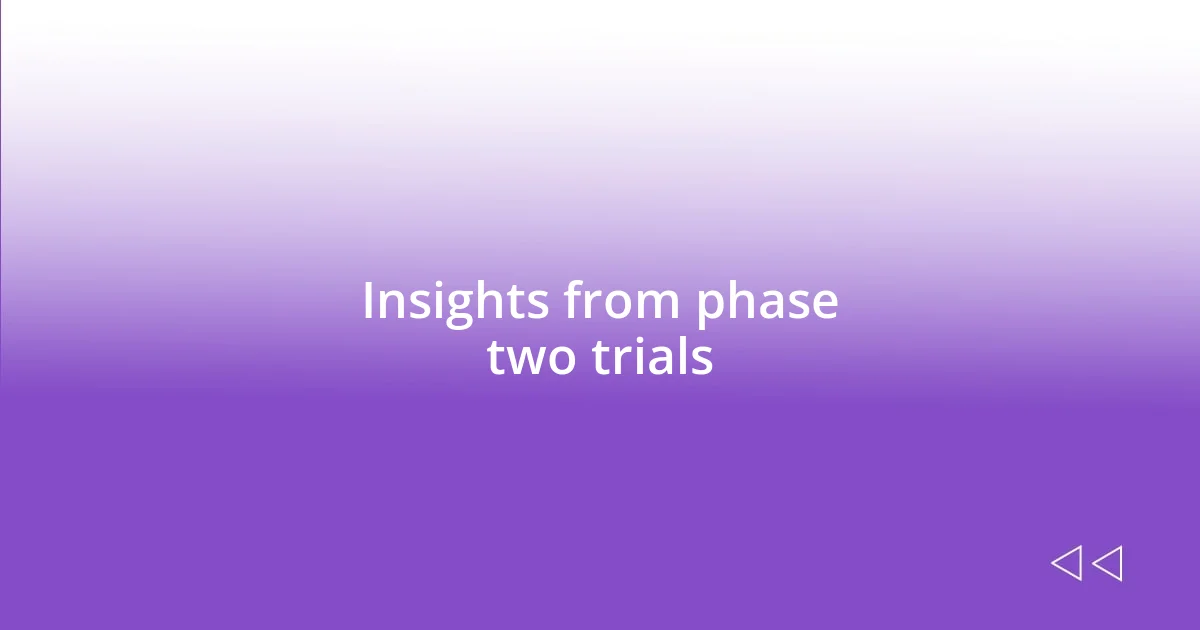
Insights from phase two trials
Phase two trials offer a unique glimpse into the realities of testing a treatment’s effectiveness. I remember feeling a mix of excitement and apprehension as we transitioned from the safety focus of phase one to seeing how the drug might actually help us. It was both exhilarating and a bit daunting to know that this stage was pivotal in determining whether the treatment could move forward.
During my time in this phase, I learned just how critical feedback from participants is. I recall a session where we were encouraged to share our experiences with side effects or improvements. I felt empowered, knowing that my voice could directly impact the treatment’s development. Have you ever felt like your input truly mattered? In that moment, I realized we were not just subjects; we were active contributors to medical science.
The camaraderie among participants deepened, as we navigated the ups and downs of trial participation together. I made friends with others who were battling similar conditions, and we often joked to lighten the mood after challenging sessions. It reminded me of how powerful shared experiences can be. Reflecting on that time, I think about how crucial it is for trial teams to foster such connections—it not only enriches the experience but can also actually enhance the quality of the data collected.
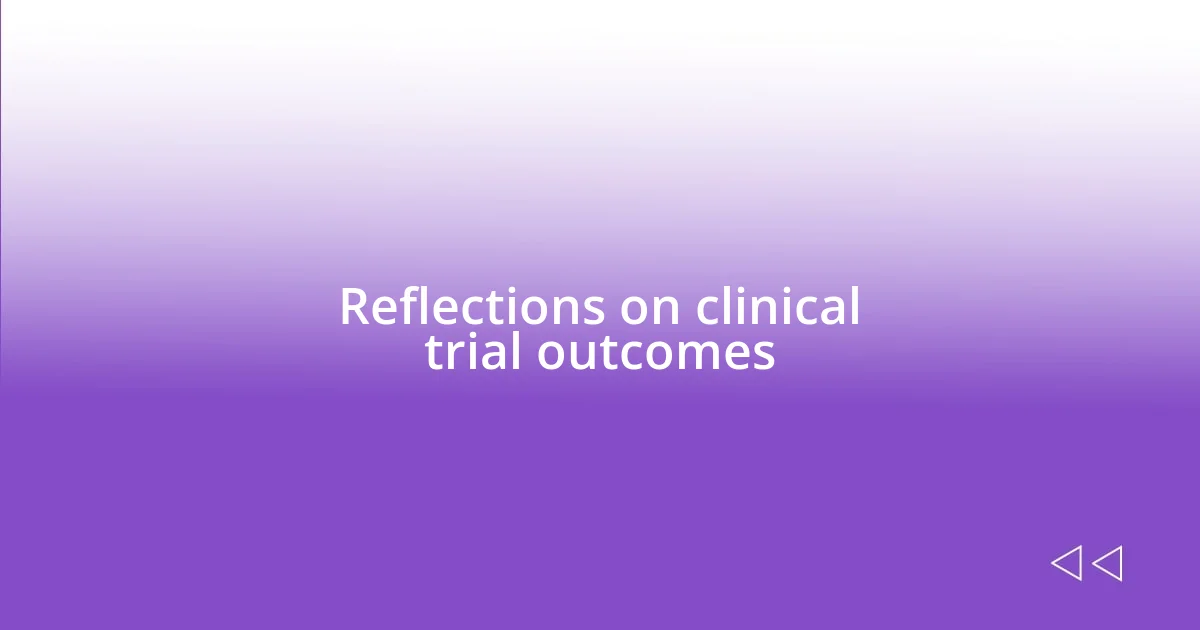
Reflections on clinical trial outcomes
Reflecting on the outcomes of clinical trials, I often think about the transformative power of participant feedback. For example, there was one moment when a certain side effect I experienced echoed a many others felt, leading to a group discussion that directly influenced the research team’s approach. Isn’t it empowering to think that our voices can mold the path of scientific discovery? It was a reminder that clinical trials are not just about the data but also about the stories and experiences behind it.
As the results started to emerge, I recall feeling a rush of anticipation. There were days filled with uncertainty as we awaited the trial’s findings. I remember discussing the potential implications with fellow participants, and it struck me just how much hope we pinned on those outcomes—hoping for relief or possibly even a cure. The emotional weight of that anticipation was intense. Have you ever felt like your hopes rested on the cusp of a breakthrough? For us, it was palpable and deeply personal.
In the end, the way clinical trials impact real lives is profound. I was deeply moved when I learned about participants from earlier phases whose stories echoed in the outcomes we were now digesting. It hit me that our collective journey—filled with highs, lows, and unexpected twists—was akin to a shared mission. Reflecting on these outcomes, I realize that each trial holds the promise of not just progress, but also the potential to reshape lives in ways we might not yet fully comprehend.






